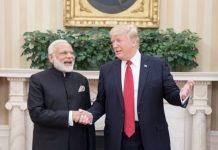
It is very easy to feel sympathetic towards The Good Road in the brouhaha that has ensued ever since the Film Federation of India (FFI) announced the Gujarati feature as its entry to the Best Foreign Film competition at the 86th Academy Awards. The film, you could make the case, is David up against the Goliath that is The Lunchbox, the presumptive nominee whose various backers have vented spleen ever since the decision.
Though both films are independent debut works, funded at least in part by the National Film Development Corporation — and so, essentially, both Davids — The Lunchbox counts Anurag Kashyap, Karan Johar and Siddharth Roy Kapur as its producers. Unlike The Good Road, which wasn’t released outside Gujarat, The Lunchbox was released in over 400 screens across the country. Its US distributor, Sony Pictures Classics, has held the rights for six of the last eight winners of the foreign picture Oscar and strongly believed Ritesh Batra’s film could go far in the competition.
The producers brought forward its release by almost five months in order to (barely) be eligible for nomination, and proceeded to tell the world that the Oscar could be India’s if only we were smart enough to enter it in the competition. The hype was so great — especially considering the film’s box office returns have, at best, been moderate — that when The Good Road was announced, it almost seemed like karma. Pride coming before a fall. The petulant reactions, from people who’ve often railed in the past against the obstacles small films face, didn’t help.
For all the talk about presenting the world with a new Indian cinema, everybody knows there are significant financial interests involved in a nomination. The Lunchbox was judged by a jury of its peers. It came up short, and unless Kashyap and company manage to prove something more substantial than allegations that smack of sour grapes, the benefit of doubt must lie with the FFI.
All this would be a much easier argument to make if The Good Road were a better movie. It’s not that it’s a particularly terrible film; it’s pretty good, in fact, for a debut. Having watched the film — yes, on torrent, sue me — it feels particularly terrible having to say bad things about a film I rather liked. As a nice, lazy afternoon movie on television — most likely Lok Sabha TV, that last platform for regional cinema to get anything resembling a national audience — The Good Road fits the bill. As potential Oscar material, it most decidedly does not.
Director Gyan Correa has suggested his film and The Lunchbox are siblings. The Good Road is more a poor cousin. And it’s not just the production values bought with a bigger budget. It’s the performances as well. Correa relied mostly on non-professionals, a strategy that has the happy result of a brilliant performance by Shamji Dhana Kerasia, a real-life truck driver. Kerasia, whose character, like Irrfan Khan’s Saajan, demands a largely internalised performance, is incredibly expressive with his eyes. He is an introvert, on one final trucking run before he fakes his own death for insurance purposes, who is forced to open up when he finds himself in loco parentis to a seven-year-old boy.
Sadly, apart from Kerasia’s role, and some excellent cinematography and music, the film doesn’t have much to offer. The plot centres on the young boy (Keval Katrodia) who wanders off and is left behind by his parents on a road trip through the Rann of Kutch. He is picked up by Pappu (Kerasia) and his assistant Shaukat (Priyank Upadhyay). His parents, meanwhile, have to scour an unforgiving, alien land for their missing child. The film works in a similar way to The Lunchbox: throw interesting characters into an interesting situation and see what comes up organically.
What does come up is the odd half-baked ‘insight’ — the trucker’s life is monotonous; there is humanity in the unlikeliest sources — but little by way of real dramatic tension. Which is strange, since dramatic events are constantly occurring in the film.
Given the evidence of the film, the FFI’s decision, however it came about, is mystifying. So is the secretive nature of the announcement, and the oddly defensive tone it has taken since. (A unanimous decision? Really?). Neither are the Academy’s arcane rules paragons of clarity and fairness. Much like so many of our recent controversies, no one has come out looking particularly good.
The Good Road was an honest piece of filmmaking, with no particular ambition, that meandered into an ugly, partisan fight through no fault of its own. It may fade away into oblivion once the nominees are announced. Meanwhile, the makers of The Lunchbox should perhaps follow Kashyap’s lead and get back to filmmaking. There’s always next year.
ajachi@tehelka.com
[egpost postid=”194828″ byline=”false”]
[egpost postid=”193299″ byline=”false”]
[egpost postid=”190867″ byline=”false”]
[egpost postid=”137643″ byline=”false”]









